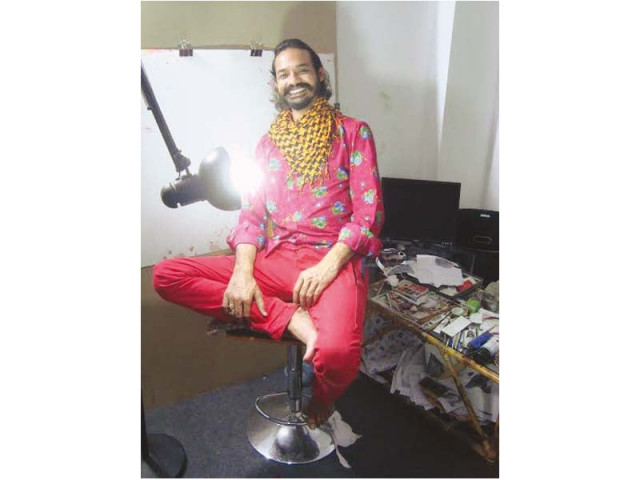The imitation game
Artist Muhammad Zeeshan takes on a critic who ruthlessly calls out plagiarism in the Pakistani art world

Internationally acclaimed artist and curator Muhammad Zeeshan. PHOTO COURTESY SANAT GALLERY
There was a twist, however. Khoshbu Ahmed was never going to be at the event. Instead, artist Muhammad Zeeshan stepped in for the controversial self-styled critic. Zeeshan is an internationally acclaimed artist and curator who graduated from the National College of Arts, Lahore, in 2003. He has taken part in numerous gallery and museum exhibitions all over the world and his work is part of permanent collections of institutions such as the British Museum in London, the Metropolitan Museum of Art in New York, and the Pacific Asia Museum, California, to name a few.

I spoke with the artist about his performance as Khoshbu at Sanat Gallery.
Shanzay Subzwari: To you, what is performance art?
Muhammad Zeeshan: It is a final work, the process of which can be seen till its finalisation. It can be staged or spontaneous. Also, somehow, the viewer becomes part of it — either as a spectator, actor or participant.
SS: You recently had a performance at Sanat Gallery that surprised many people. Tell me more about how the idea was conceived and executed.
MZ: The performance was based on Khoshbu Ahmed, who is currently a social media phenomenon in art circles in Pakistan. Since her true identity isn’t known, people keep questioning, guessing who she actually is… hence everything she does on social media, (i.e. highlighting Pakistani artists’ works as ‘copies’ or imitations of foreign artists), is something artists want to respond to, but do so only in a myopic, closed circle. Thus, my performance meant to provide a platform for a wider, collective discussion on this topic.
SS: What does Khoshbu Ahmed mean to you and what do you think she stands for?
MZ: Art students, teachers, practitioners, galleries, and collectors often compare and point out similarities between art works. This is never taken as negative, rather, it is seen as constructive debate and discussion. Khoshbu Ahmed puts up similar works online and leaves it to the viewer to respond to them. Not knowing who she truly is makes it interesting.
 Khoshbu Ahmed shares images of the works of local & international artists on her Facebook page.
Khoshbu Ahmed shares images of the works of local & international artists on her Facebook page.SS: Why did you initially advertise the performance at Sanat Gallery as ‘A Talk With Khoshbu Ahmed’, and subsequently act as if you were ‘Khoshbu’ in your performance? Do you think this approach was more effective as compared to simply inviting people to a discourse about her activity on social media?
MZ: By acting the part of Khoshbu, I wanted to create a space/platform for discussion and debate. The irony and ambiguity of whether she’ll actually be there was the bigger question I wanted to arouse. People even bet on it! Interestingly, when talking about her, people had both positive and negative things to say. At one point, all of those in the audience became ‘Khoshbu Ahmed’.
SS: Were the reactions you received expected?
MZ: As an artist or human being, we anticipate reactions and think of possibilities beforehand. While we couldn’t possibly have known what questions people would ask, Muniza Agha-Fawad (the moderator), Abid Merchant (owner of Sanat Gallery) and I had planned, discussed and rehearsed this performance piece. However, absolutely no one expected me to be there as Khoshbu. When I took over the responsibility of Khoshbu’s actions (metaphorically) as part of this performance, an artist revealed his disappointment over how Khoshbu (I) had compared his work to a magazine cover, stating she (I) ‘poured water’ over 30 years of his hard work by that single comparison online. That’s when I felt the intensity of his sentiments, perhaps echoed by many others. I didn’t reveal to the audience till the end that this was a performance by me, and that I’m not actually Khoshbu.
 Discussion during the performance ‘A Talk With Khoshbu Ahmed’ at Sanat Gallery. PHOTO COURTESY SHANZAY SUBZWARI
Discussion during the performance ‘A Talk With Khoshbu Ahmed’ at Sanat Gallery. PHOTO COURTESY SHANZAY SUBZWARISS: What is your personal opinion on Khoshbu’s actions, and can you tell the readers your views about artistic appropriation and plagiarism?
MZ: I feel if an artist’s work is called a copy by anyone, it depends on him how to respond to that and take what he wants from it. As stated before, my focus was on people speaking together about Khoshbu’s actions in a collective platform; I wanted people’s views. I didn’t, and don’t want to personally comment on what she’s doing. I got a myriad of views and reactions from people, which was the beauty of the performance. There was healthy debate. Also, this was the first performance of many I am considering, based on those whose identities are deliberately kept hidden or anonymous.
SS: Why did you want to bring this issue to this level of debate in the first place?
MZ: I felt it lacked discussion on a mature level. Also, Khoshbu was only a point of discourse that branched out into so many important discussions: art-market-related, identity-related, appropriation-related and so on.
SS: Do you think technology plays a big role in formulating people’s opinions?
MZ: Yes, but I feel smart people will research further to dig up the truth and (in this case) research on artists rather than believing one person.
SS: Thank you for your time, Zeeshan! Great talking to you.
MZ: Thank you, likewise.
Shanzay Subzwari is an artist and art writer based in Karachi.
She tweets @ShanzaySubzwari
Published in The Express Tribune, Sunday Magazine, September 13th, 2015.



















COMMENTS
Comments are moderated and generally will be posted if they are on-topic and not abusive.
For more information, please see our Comments FAQ